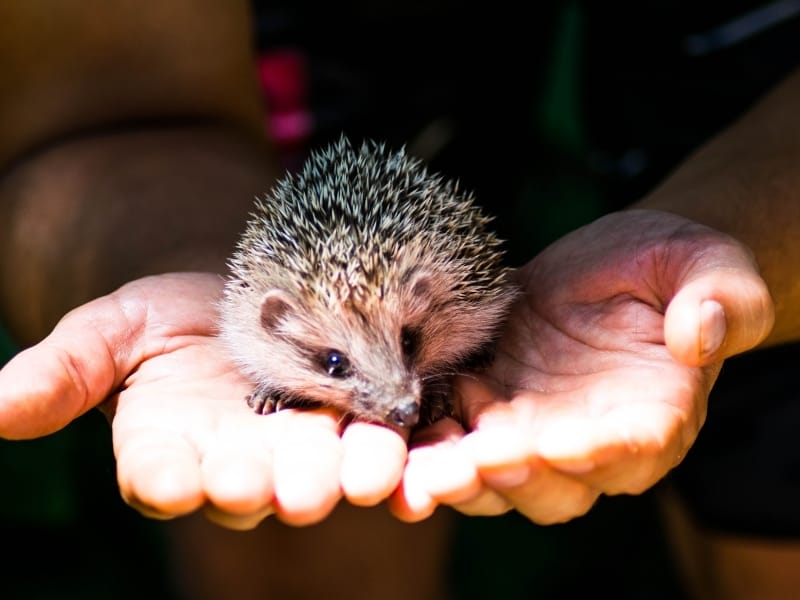
Cute, cuddly, and quiet hedgehogs make great companions and have gained huge popularity as pets. Pet hedgehogs are shy at first but will warm to their people in time and get used to handling and interaction.
How to care for a pet hedgehog? Pet hedgehogs require a lot of care to stay healthy and happy. Hedgehogs need a spacious enclosure with an external heating source, place to burrow and sleep in, and a running wheel for exercise. Keeping the enclosure clean is a must, otherwise your hedgehog can develop health problems.
In this article, we’ll tell you everything you need to know about owning a pet hedgehog. Let’s get you prepared for welcoming a cute and prickly member into your family!
Is a Hedgehog a Good Pet?
Owning a hedgehog as a pet has become increasingly popular in recent years. But, due to their uncommon nature and unique needs, a lot of people don’t know if hedgehogs are good pets.
Hedgehogs aren’t extremely high maintenance pets, but like any other animal, they have unique needs and require proper care. When given everything they need, hedgehogs will thrive and be amazing pets.
However, this doesn’t mean that hedgehogs are ideal pets for everyone. There are a lot of things you need to consider, like your lifestyle, schedule, and legality, before you bring a hedgehog into your home.
Can a Pet Hedgehog Hurt You?
If you are thinking about getting a pet hedgehog, you’re probably wondering if handling one is going to hurt or cause injury. The only way a hedgehog can hurt you is when he curls in a defensive position and forms a tight ball so his quills become more spread out.
Although this can be painful, the quills shouldn’t break your skin or cause serious injury. If this ever happens, just wait for your hedgehog to calm down and for the quills to go back to normal.
Keep in mind that hedgehogs can bite and that biting can hurt you. However, this rarely happens and is in most cases a sign that your hedgehog is ill or in pain.
Hedgehog Needs and Requirements

There are 17 different species of hedgehogs, but the African pygmy hedgehog Atelerix Albiventris is the species bred for the pet trade. While other species of hedgehogs can also be great pets, African pygmy is often the best choice since it’s the smallest one and very easy to handle.
If you are planning to add a pet hedgehog into your family here are a couple of things you should think about:
Food and Diet
Wild hedgehogs eat a variety of plants, bugs, and roots. And while this exact diet can be challenging to recreate, feeding a pet hedgehog isn’t as hard as it might seem.
A lot of owners feed their hedgehogs with moist and dry cat food since it has all the essential nutrients a hedgehog needs. But you can also find specially formulated hedgehog food or insectivore diets that are available commercially.
Additionally, you’ll need to supplement your hedgehog’s diet with nutritious snacks. Fruits and vegetables can be great snacks and will help balance your hedgehog’s diet and keep him healthy and happy.
One thing to keep in mind is that hedgehogs like food and have the potential to overeat. If you aren’t careful, your pet hedgehog can become overweight and develop health problems.
Housing
Hedgehogs are solitary animals that prefer to be housed alone. While they often fight with other hedgehogs they seem to tolerate living with cats and dogs very well.
While they might seem clumsy, hedgehogs are extremely active and need enough room to run around and explore. To keep your pet hedgehog happy, you’ll need a large enough enclosure that will accommodate his every need.
A two by three-foot enclosure should be enough, but bigger is always better. The enclosure should have smooth sides, so a large aquarium or a modified storage container can serve as a great hedgehog enclosure.
Since hedgehogs come from tropical climates, you’ll need to equip the enclosure with an external heat source, such as a heating lamp or a heating pad. Pet hedgehogs do best when the temperature is between 75 and 85 degrees Fahrenheit.
Anything hotter or colder than that can send your pet hedgehog into estivation or hibernation which can cause serious health problems.
Interaction
Hedgehogs are very solitary small animals that need time to warm up to people. So, be prepared to work with your pet hedgehog and be patient if you want to gain his trust.
When you bring a pygmy hedgehog Atelerix Albiventris home, give him a few days to settle in and get used to his new home. After a couple of days start some light handling at night while your hedgehog is awake to get him used to your scent and hands.
It’s important to go slow with socialization and interaction and give your hedgehog time to adapt to his new surroundings and form a bond with you.
Activity
Hedgehogs are nocturnal animals, which means that they sleep during the day and are active at night. Most hedgehogs start their days around dinner time, which gives you just enough time to interact with your pet before heading to bed.
And while they are small, hedgehogs are extremely active and agile and will spend their waking hours running, playing, or burrowing. The best way to support your pet’s active lifestyle is to get a running wheel for his enclosure and let him put his running skills to the test.
Care
Taking care of a pet hedgehog isn’t as hard as it might seem. You’ll need to clean your pet’s enclosure weekly to keep him healthy and prevent odor build-up.
Hedgehogs don’t use litter pans like cats, so keeping a regular cleaning schedule is a must for sanitary reasons. Use recycled paper of fleece bedding as lining and provide a hiding space inside the enclosure so your hedgehog can burrow and sleep comfortably.
Important Things to Consider

Owning exotic pets is all the rage, but there are several important things you need to consider before adding a hedgehog into your family.
Legality
Hedgehogs are legal in most parts of the US, however, owning one as a pet is restricted or illegal in Georgia, Hawaii, California, Pennsylvania, and New York City. If you live in New Jersey or Wisconsin, you’ll need a special permit or health certificate to own a pet hedgehog.
While these restrictions might seem harsh, they are necessary since some species of wild hedgehogs can carry foot and mouth disease. This is a highly contagious disease that primarily affects cattle, sheep, goats, and pigs.
Health Problems
Like any other animal, hedgehogs can develop health problems and should go to annual veterinary checkups. Obesity is one of the most common problems seen in pet hedgehogs and it’s caused by overeating.
Hedgehogs are prone to progressive paralysis which is caused by a genetic condition known as wobbly hedgehog syndrome. Keep in mind that hedgehogs can also suffer from different cancerous and heart conditions.
Skin problems, ear mites, internal parasites, and respiratory infections are fairly common, but you can avoid them if you regularly clean your pet’s enclosure.
Hedgehog Noise
Most people don’t know how expressive hedgehogs are and end up surprised by the range of noises they can make. Luckily, hedgehogs aren’t very loud, so your pet’s hisses and snorts won’t keep you up all night.
As you get to know your hedgehog better, you’ll start to understand what each sound means and get a better sense of how your pet is feeling.
Hedgehog Playfulness
While hedgehogs are a bit shy and reserved at first, they are quite adventurous animals that love to play. Keep in mind, some hedgehogs might be mellower than others, but generally, they are fairly energetic and fun.
Depending on his personality, your hedgehog might try climbing onto the sofa, or be content dragging toys around his enclosure. To keep things interesting get a running wheel, jingle balls, and plush toys for your hedgehog.
Handling
If you never owned a hedgehog before, handling one can seem like an impossible feat due to their prickly appearance. While their quills make hedgehogs interesting, they can also make handling rather challenging.
At first, handling a hedgehog can be uncomfortable and slightly painful, since they get nervous and scared easily. This is quite common since hedgehogs are shy creatures and need time to warm up to people and new surroundings.
But, as you get to know each other better, your hedgehog will become relaxed and easier to handle and cuddle.
Conclusion
Prickly and cute looking, hedgehogs make great pets, especially for people who suffer from allergies. Although they are fairly low maintenance animals, hedgehogs have special needs and deserve an understanding owner who will provide proper care.
Before you do anything, check if owning a hedgehog as a pet is legal in your state and if it is, get one from a reputable breeder. When properly cared for, hedgehogs make great pets and will surprise you with their funny and playful nature.
Related Articles:

